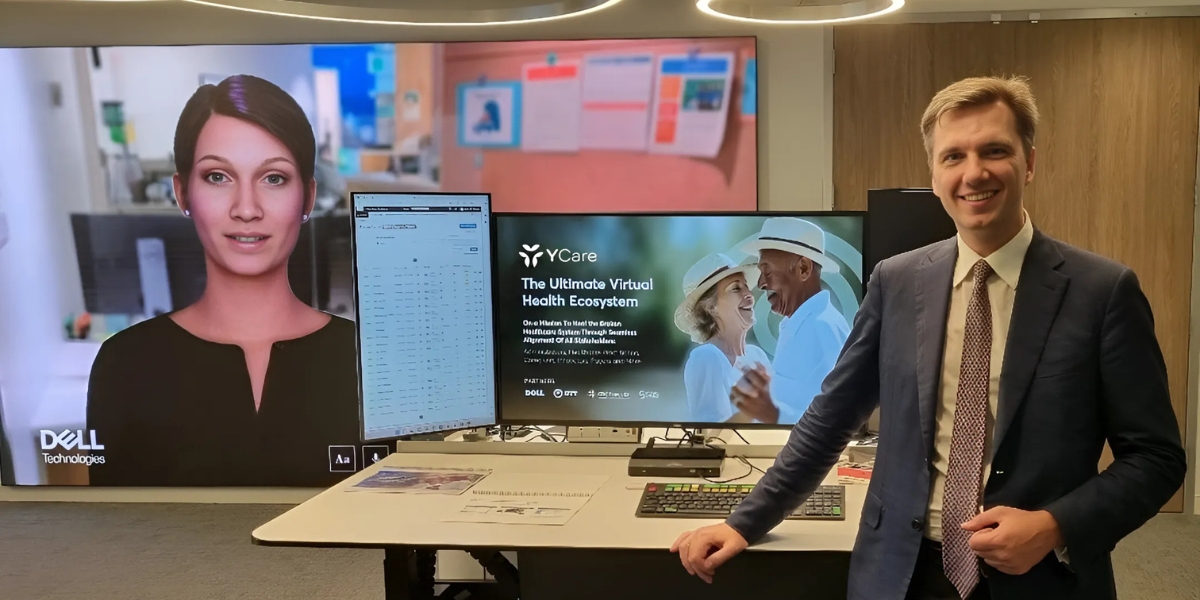What if quality healthcare didn’t have to revolve around hospital beds? For decades, healthcare delivery has relied on centralized systems that often struggle to balance efficiency and patient satisfaction. Fortunately, hospital-at-home care models, where patients may receive high-quality medical treatment in the comfort of their own homes, have been gaining momentum. Yet, despite their promise, they have faced persistent hurdles, including fragmented systems, incompatible technologies, and inefficiencies that overwhelm providers and patients alike. These challenges create logistical nightmares, increase costs, and contribute to clinician burnout.
Enter YCare, a unified platform designed to untangle these complexities. By seamlessly integrating with existing health systems, YCare allows healthcare providers to deliver patient-centered, result-oriented care in patients’ homes without the headaches of a technological overhaul.
“All the tools exist,” says Allan Gobbs, YCare’s Chairman and CEO. “What’s been missing is integration, which ties it all together for health systems, healthcare practitioners, payors, and patients. That’s where we come in.”
A Simple Solution to a Big Problem
“Health systems are juggling dozens of apps, incompatible devices, and an unmanageable number of EMR integrations that don’t talk to each other. This lack of integration creates inefficiencies, drains resources, and frustrates everyone involved,” explains Gobbs.
YCare, created by Vadim Cherdak, a serial entrepreneur with experience in tech leadership at Citigroup and Bell Labs, offers a platform that simplifies healthcare operations. It combines various tools, such as EMRs, remote monitoring, and virtual visits, into a single dashboard. The platform is compatible with any device and existing health system without costly upgrades. Alerts are streamlined into one app with unified dashboards and key data syncs with EMRs like EPIC, Oracle Health, and PointClickCare, helping reduce manual data entry and minimize errors.
This approach doesn’t just make life easier for hospitals. It also helps clinicians by streamlining their day-to-day operations, all while improving the quality of patient care. Clinicians may access all patient data, vitals, medication schedules, progress notes, and lab results in one place, eliminating the need to switch between multiple systems. It also integrates real-time data from patients’ wearable devices, enabling seamless care team coordination and offering predictive analytics to identify potential issues early. The platform provides an intuitive interface, customizable templates, and routine task automation, helping streamline workflows and allow more focus on patient care. This can reduce the time spent navigating complex systems and managing repetitive processes. It simplifies system management for IT teams and can lower maintenance costs by reducing the number of integrations needed.
The Patient Experience: Care from Home
For patients, YCare is highly beneficial as well. Instead of going to the hospital frequently, which may be stressful and disruptive to recovery, patients can receive the same quality of care in their homes. With real-time monitoring and easy communication with healthcare providers, YCare helps patients stay on track with their recovery, which reduces hospital readmissions and supports better overall outcomes.
YCare aims to make healthcare more efficient while offering potential financial benefits. Medicare reimbursements for hospital-at-home programs may be higher than the costs of implementing YCare, which could lead to a positive return on hospital investment. Additionally, by potentially reducing hospital readmissions, YCare may help hospitals avoid penalties while supporting patient wellness and satisfaction.
Building Trust Through Partnerships
YCare’s growing list of partnerships shows the platform’s value. Collaborations with major health systems like the University of Florida Health and its involvement in NYU’s Endless Frontier Labs program, focused on integrating with major NYC health systems, demonstrate YCare’s commitment to innovation and impact.
YCare works with InterSystems, a major provider of patient data solutions, which helps the platform be secure and scalable and can support larger healthcare organizations. “InterSystems technology is the backbone for many of the world’s largest health systems,” says Gobbs. “Partnering with them gives us a huge edge. It’s about speed, security, and scalability.”
YCare collaborates with Dell Technologies for cloud computing and AI solutions, which help improve scalability and system reliability for healthcare providers. Additionally, its partnership with the CDC Foundation supports its focus on addressing clinical relevance in public health challenges and aligns with priorities in population health management.
A Market Ready for Growth
The hospital-at-home market is projected to experience notable growth, offering potential opportunities for YCare. McKinsey has estimated the market’s value to be hundreds of billions, with a small portion currently in use. While the pandemic increased demand for virtual and home-based care, many hospitals have encountered challenges in scaling these programs. YCare aims to address these challenges by providing hospitals with a solution to extend their services beyond traditional hospital settings.
With a strong market potential, proven partnerships, and a platform ready to scale, YCare is crashing through barriers and primed for rapid growth. Their mission goes beyond technology; it’s about creating a healthcare experience that works for everyone involved. Gobbs explains: “Hospitals improve their financial stability and patient outcomes. Patients receive high-quality, compassionate care at home. And the healthcare system moves closer to a future where care is more integrated and centered on the patient, where it should be.”
To learn more about YCare, visit https://y.care/.
Disclaimer: The information provided in this article is for informational purposes only and does not constitute medical advice. YCare’s platform and its features are subject to change. The efficacy, outcomes, and financial benefits of using YCare’s services may vary based on individual circumstances and healthcare systems. Readers are encouraged to consult with healthcare professionals for personalized advice and to evaluate any technological solutions before implementation in their healthcare practice.
Published by Stephanie M.
















